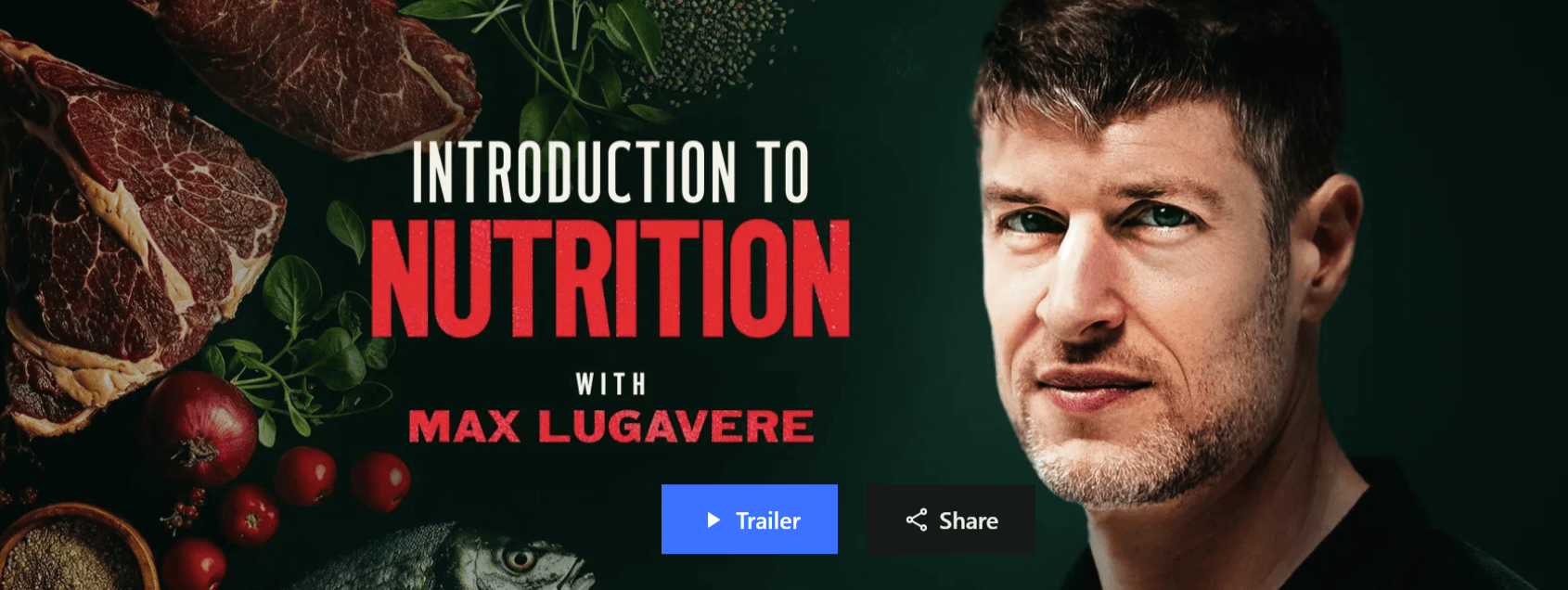A six-hour course, Max Lugavere introduces the fundamentals of nutrition with a focus on achieving optimal health, longevity, and performance.
Explore the importance of whole foods, maintaining macronutrient balance, the essential roles of micronutrients, and the harmful effects of ultra-processed foods on health.
File Size: 4.625 GB.
Format File: 8 MP4; 8 SRT; 9 TXT.
Peterson Academy – Max Lugavere – Intro to Nutrition

In Intro to Nutrition, a six-hour course, Max Lugavere introduces the fundamentals of nutrition with a focus on achieving optimal health, longevity, and performance. We explore the importance of whole foods, maintaining macronutrient balance, the essential roles of micronutrients, and the harmful effects of ultra-processed foods on health. The course also covers key concepts such as nutrient timing and customizing diets to meet individual goals. Additionally, we provide a balanced examination of controversies in nutrition science. The course concludes by highlighting the crucial role of the human microbiome in supporting overall well-being.
Lectures
1. Nutritional Fundamentals
In our first lecture, we begin with the fundamentals of nutrition, focusing on its practical aspects for optimal health, longevity, and performance. Instructor Max Lugavere breaks down the key components of nutrition, focusing on macronutrients (carbohydrates, fats, and proteins), and discusses the impact of ultra-processed foods on health. The lecture emphasizes the importance of understanding nutrition as a powerful tool for disease prevention and for the optimization of life quality.
2. Satiety Superstars
In lecture two, we look at the fundamentals of a healthy diet, discussing the importance of energy balance, macronutrient and micronutrient needs, and the role of satiety in optimizing nutrition. Max Lugavere emphasizes the significance of protein, fiber, and water as the three “satiety superstars” and highlights the benefits of consuming whole foods while minimizing ultra-processed foods for overall health and well-being.
3. Nutrition Standards
In lecture three, we dive into the complexities of nutrition, emphasizing the importance of focusing on whole foods rather than isolated nutrients. We also discuss the detrimental health effects of the Standard American Diet, which is high in ultra-processed foods, and hone in on the characteristics and negative impacts of these foods on various health outcomes.
4. Nutrient Timing
In lecture four, we cover the concept of nutrient timing, focusing on circadian biology, time-restricted eating, and the impact of meal timing on metabolic health and body composition. Max Lugavere discusses the potential benefits of early time-restricted eating, the role of protein intake in muscle synthesis and recovery, and the importance of overall diet quality in achieving optimal health outcomes.
5. Dietary Tailoring
In lecture five, we delve into tailoring dietary recommendations to individual goals, discussing popular dietary patterns like carnivore, paleo, vegan, Mediterranean, ketogenic, DASH, and MIND diets, and their varying levels of evidence. We examine why most diets fail due to lack of adherence and the importance of finding a sustainable approach that nourishes the body and aligns with personal preferences. The lecture emphasizes strategies for fat loss, such as slower weight loss, protecting lean mass through resistance training, and optimizing protein intake, while dispelling common myths about metabolic damage and age-related metabolic slowdown.
6. Nutrition Controversies
In lecture six, Max discusses various controversies and misconceptions in nutrition science. He emphasizes the limitations of epidemiological studies, which can only establish correlations and not causation, and stresses the importance of randomized controlled trials in determining causal relationships. The lecture also covers the benefits and drawbacks of animal-source and plant-source foods, highlighting the concept of hormesis and the role of phytochemicals in promoting health, while cautioning against the reductionist approach of “nutritionism.”
7. Genius Foods
In lecture seven, we highlight the importance of metabolic health and the “genius foods” that support overall well-being. Max emphasizes the benefits of exercise for improving metabolic markers and brain health, and highlights specific foods, such as berries, nuts, cruciferous vegetables, dark leafy greens, ruminant meat, eggs, dark chocolate, olive oil, wild fish, and avocados, which are associated with reduced risk of chronic diseases and improved cognitive function.
8. Microbiome Mastery
In our eighth and final lecture, we wrap up by discussing the importance of the human microbiome, focusing on the oral and gut microbiomes, and discuss how dietary and lifestyle choices can influence these microbial communities. Max emphasizes the role of the gut microbiome in immune function and nutrient extraction, and provides practical tips for supporting a healthy microbiome, such as consuming diverse plant fibers, fermented foods, and avoiding excessive use of antibiotics and processed food additives. The lecture also covers the significance of proper digestion, the benefits of various dietary supplements, and the potential impact of these factors on overall health and well-being.
Course Features
- Lectures 0
- Quizzes 0
- Duration 10 weeks
- Skill level All levels
- Language English
- Students 116
- Assessments Yes










